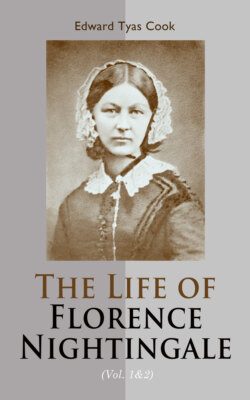Читать книгу The Life of Florence Nightingale (Vol. 1&2) - Edward Tyas Cook - Страница 73
На сайте Литреса книга снята с продажи.
III
ОглавлениеMiss Nightingale assumed responsibility on one occasion as a builder, and this was at the time the usurpation which was most condemned in some quarters and the most commended in others. Some wards in the Barrack Hospital were in so dilapidated a condition as to be unfit for the reception of patients. The Commander-in-Chief had warned the hospital authorities that additional sick and wounded might shortly be upon their hands. The uninhabited wards might by prompt expenditure be made capable of accommodating 800 cases. The expenditure, however, would be considerable, and no one seemed willing to incur it without superior authority. Miss Nightingale stepped into the breach. With the concurrence of Dr. McGrigor, a senior medical officer of the hospital, she represented the urgency of the case to Lady Stratford de Redcliffe. The Ambassador had been empowered, as we have seen, to incur expenditure; and his wife, as she had given Miss Nightingale to understand, was the authorized intermediary between the Ambassador and the authorities of the hospitals. Lady Stratford saw the urgent necessity of the work, and Mr. Gordon, the chief of the engineering staff, was instructed to put it immediately in hand. The workmen, 125 in number, presently struck, whereupon Miss Nightingale, on her own authority, succeeded in engaging 200 other workmen, and the work was rapidly completed. Lord Stratford subsequently disclaimed any responsibility,121 and Miss Nightingale paid the bill out of her own private resources. The War Department, when the affair came to their knowledge, approved her action, and reimbursed her. This instance of “the Nightingale power” made a great impression, and she herself regarded it as the most beneficent thing she did in the East. The fame of the affair was noised abroad, and reached the British camp at Balaclava, where our unfailing friend, Colonel Sterling, heard of it with hot indignation. Miss Nightingale, he wrote, “coolly draws a cheque. Is this the way to manage the finances of a great nation? Vox populi? A divine afflatus. Priestess, Miss N. Magnetic impetus drawing cash out of my pocket!” In normal times it would certainly not be the way to manage the finances of a great nation. And even in times of emergency the way which would of course have occurred to any well-regulated slave of routine was that Miss Nightingale should have spoken to some officer on the spot, that he should have represented the case to the Director-General of the Army Medical Department in London, that the Director-General should have moved the Horse Guards, and the Horse Guards the Ordnance, that the Ordnance should then have approached the Treasury, and that after process of minuting and countersigning, the work should in due course have been officially ordered. But meanwhile Lord Raglan's wounded would have arrived at the hospital, and there would have been no wards ready to receive them. As it was, “the wards were ready,” as Miss Nightingale reported to Mr. Herbert (Dec. 21), “to receive 500 men on the 19th from the ships Ripon and Golden Fleece. They were received in the wards by Dr. McGrigor and myself, and were generally in the last stage of exhaustion. I supplied all the utensils, including knives and forks, spoons, cans, towels, etc., clearing our quarters of these.”
